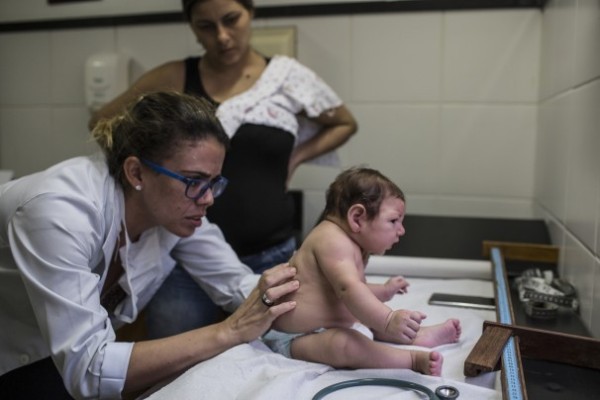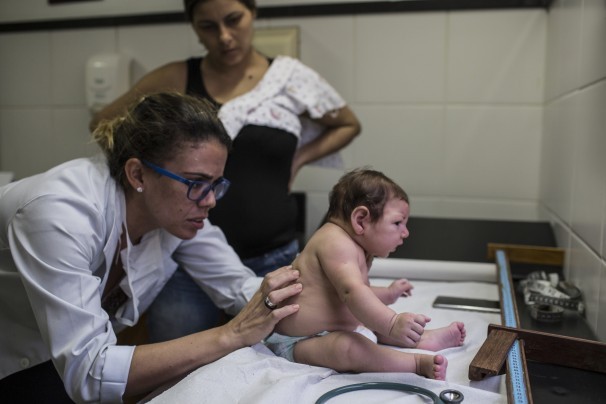 MEXICO CITY — The rapid spread of the Zika virus has prompted Latin American governments to urge women not to get pregnant for up to two years, an extraordinary precaution aimed at avoiding birth defects believed to be linked to the mosquito-borne illness.
MEXICO CITY — The rapid spread of the Zika virus has prompted Latin American governments to urge women not to get pregnant for up to two years, an extraordinary precaution aimed at avoiding birth defects believed to be linked to the mosquito-borne illness.
What until recently was a seemingly routine public health problem for countries that are home to a certain type of mosquito has morphed into a potentially culture-shaping phenomenon in which the populations of several nations have been asked to delay procreation. The World Health Organization says at least 20 countries or territories in the region, including Barbados and Bolivia, Guadeloupe and Guatemala, Puerto Rico and Panama, have registered transmission of the virus.
Although the Zika virus has been documented since the 1940s, it began its assault on Latin America in the past several months. The hardest-hit country has been Brazil, where more than 1 million people have contracted the virus. In the past four months, authorities have received reports of nearly 4,000 cases in which Zika may have caused microcephaly in newborns. The condition results in an abnormally small head and is associated with incomplete brain development. Colombia, which shares an Amazonian border with Brazil, reacted to its own Zika outbreak, numbering more than 13,000 cases, by urging women not to get pregnant in the next several months. Other countries, including Jamaica and Honduras, also have urged women to delay having babies.
After more than 5,000 suspected Zika cases were reported last year and in the first weeks of 2016, El Salvador on Thursday took the most extreme stance so far: Deputy Health Minister Eduardo Espinoza urged women to refrain from getting pregnant before 2018. The Central American nation saw its first suspected Zika cases in November and sent samples to the United States to be tested for the virus, Espinoza said in an interview.
Authorities have confirmed a dozen cases of Zika virus in the United States. Here’s what you need to know. (Gillian Brockell/The Washington Post)
“The recommendation is that people plan their pregnancies, that they avoid if at all possible to have babies this year,” Espinoza said. “This is the first time that we have suffered an attack of Zika virus, and the first attack is always the worst.”
A campaign to delay pregnancy would seem to be an implicit endorsement of birth control. For a region that is majority Roman Catholic, this presents a potential conflict, as the church has long condemned contraception. The Rev. Hector Figueroa, a priest in charge of health issues in the San Salvador archdiocese, said that the pregnancy alert appeared in the Salvadoran news media Friday morning and that the archbishop had not had time to formulate an official response.
“Morality says that people shouldn’t have that control” over procreation, Figueroa said. “But the church also isn’t going to say something that runs contrary to life and health.”
“This is a very delicate issue,” he said.
As in other countries in the region, Salvadoran authorities have tried to slow the spread of Zika by launching fumigation programs in mosquito-breeding areas. Radio and television public-service campaigns have called on pregnant women to cover their skin to avoid bites.
Outside the National Maternity Hospital in San Salvador, Selina Velasquez Cortez, a 30-year-old employee of a sardine factory who has been trying to get pregnant for two years, said there is no way she will stop trying now.
“After so much time wanting to be a mother, I’m not going to give up now” because of the deputy health minister’s statement, she declared. “I think it’s absurd.”
Most people who have contracted the illness experience no symptoms. But Dinora Martinez, a 46-year-old secretary at a private health clinic in San Salvador, said she, her husband and their two adult sons had suffered when they contracted the virus in 2015.
“Pain, fever, aching joints. I couldn’t move my feet and thought I’d never be able to walk again,” she said. Her office has seen a rise in the number of Zika patients.
“The clinic has been full,” she said.
The Centers for Disease Control and Prevention on Friday added eight to a list of 14 countries and territories it has urged pregnant U.S. women to avoid because of the risk associated with Zika outbreaks. So far there is no vaccine for the virus.
Zika is spread by two types of Aedes mosquitoes, which carry a clutch of fever-causing pathogens as they buzz in search of fresh blood. Besides the Zika virus, the mosquitoes transmit dengue, chikungunya and yellow fevers. An adult who contracts Zika might find the experience relatively mild: a slight fever, a rash, and pain in the joints and behind the eyes.
But the real devastation apparently strikes the children born to women with the illness, who can have permanent physical and mental defects, according to research in Brazil linking a surge in the number of microcephaly cases to Zika. There is also growing concern that Zika virus could be linked to Guillain-Barré syndrome, which can result in weeks of paralysis.
In the city of Santa Marta on Colombia’s Caribbean coast, a nurse in the maternity ward at the Clinica La Milagrosa said that the news about Zika and possible birth defects has scared many people. At least 500 of Colombia’s reported Zika cases involve pregnant women, according to the Health Ministry.
“There are women coming in really worried,” said the nurse, who spoke on the condition of anonymity. “With everything that’s on the news about malformations, mothers are scared.”
Health Minister Alejandro Gaviria has advised Colombians to delay pregnancy for the next six to eight months. So far, 106 babies have been born to Zika-infected mothers, and the infants are under observation to determine whether their development has been affected by the virus, the ministry said. Colombia expects as many as 700,000 infections in the general population.
Gabriela Martínez in Mexico City, Julia Symmes-Cobb in Bogota, and Sarah Esther Maslin in San Salvador contributed to this report.











Sign up on lukeunfiltered.com or to check out our store on thebestpoliticalshirts.com.